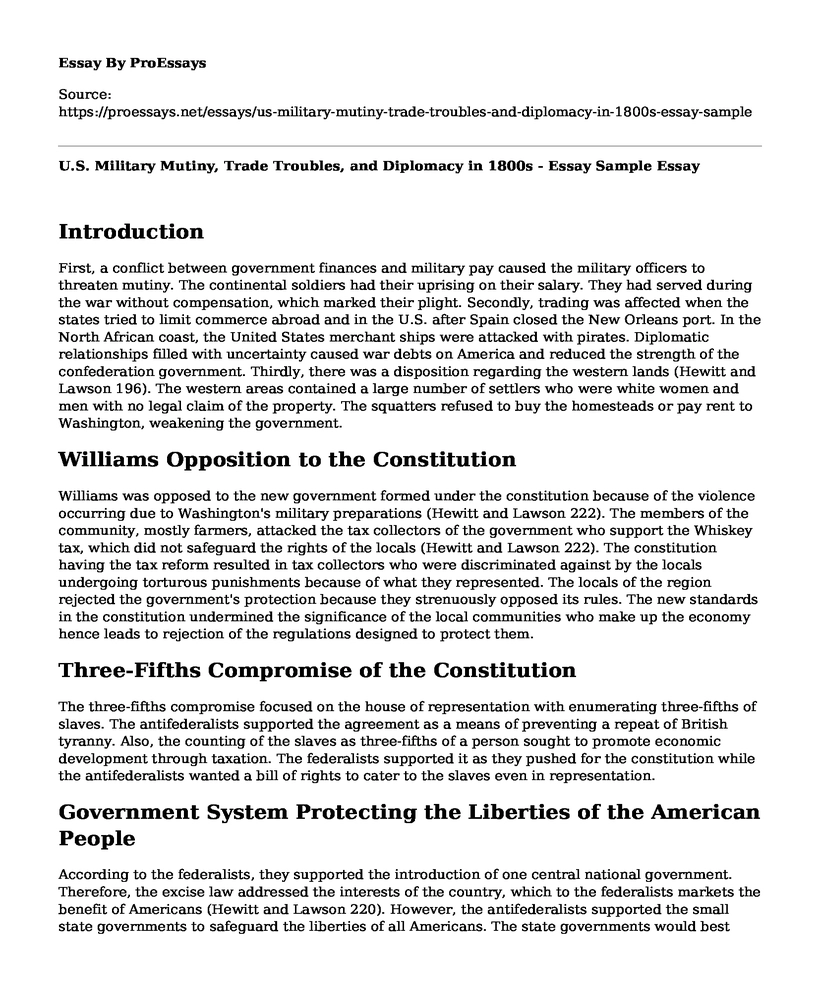Introduction
First, a conflict between government finances and military pay caused the military officers to threaten mutiny. The continental soldiers had their uprising on their salary. They had served during the war without compensation, which marked their plight. Secondly, trading was affected when the states tried to limit commerce abroad and in the U.S. after Spain closed the New Orleans port. In the North African coast, the United States merchant ships were attacked with pirates. Diplomatic relationships filled with uncertainty caused war debts on America and reduced the strength of the confederation government. Thirdly, there was a disposition regarding the western lands (Hewitt and Lawson 196). The western areas contained a large number of settlers who were white women and men with no legal claim of the property. The squatters refused to buy the homesteads or pay rent to Washington, weakening the government.
Williams Opposition to the Constitution
Williams was opposed to the new government formed under the constitution because of the violence occurring due to Washington's military preparations (Hewitt and Lawson 222). The members of the community, mostly farmers, attacked the tax collectors of the government who support the Whiskey tax, which did not safeguard the rights of the locals (Hewitt and Lawson 222). The constitution having the tax reform resulted in tax collectors who were discriminated against by the locals undergoing torturous punishments because of what they represented. The locals of the region rejected the government's protection because they strenuously opposed its rules. The new standards in the constitution undermined the significance of the local communities who make up the economy hence leads to rejection of the regulations designed to protect them.
Three-Fifths Compromise of the Constitution
The three-fifths compromise focused on the house of representation with enumerating three-fifths of slaves. The antifederalists supported the agreement as a means of preventing a repeat of British tyranny. Also, the counting of the slaves as three-fifths of a person sought to promote economic development through taxation. The federalists supported it as they pushed for the constitution while the antifederalists wanted a bill of rights to cater to the slaves even in representation.
Government System Protecting the Liberties of the American People
According to the federalists, they supported the introduction of one central national government. Therefore, the excise law addressed the interests of the country, which to the federalists markets the benefit of Americans (Hewitt and Lawson 220). However, the antifederalists supported the small state governments to safeguard the liberties of all Americans. The state governments would best protect the interest of the people because they avoid factionalism by collaborating to promote their competing interests.
Significant Areas of Disagreements between Federalist and Antifederalists
First, they disagreed about the ratification of the constitution to develop one central government with fear that it would not safeguard the freedoms and rights of all Americans (Hewitt and Lawson 206). The series of security acts passed by the federalists demonstrated the effect of having a lot of power. The alien and sedition laws attacked the minority who made up the antifederalist (Hewitt and Lawson 213). Secondly, they disagreed on taxes and duties, especially the excise tax introduced on whiskey with the speculated aim of being in favor of the ambitious men in the country. The interest of the farmers was not held accountable hence the tax would be an exploitation of the significant population of the nation (Hewitt and Lawson 219). Thirdly, the power of the federal government on its citizens was excess. The constitution provided the federal government with excess authority without accountability, which led to the use of force against the rebels.
James Madison Counter Points
James Madison focus on the tyranny of the majority described the significance of the small units of the government. He rejected the idea of dominant and abundant central government preventing factionalism. With the idea that the stable central government will have the interest of the creditors and not the farmers, the duties pit on the distilled spirits from the produce would discourage agriculture (Hewitt and Lawson 219). The merchants, lawyers, and planters imposing heavy duties on agriculture, which makes up the poorer and laborious class will create difficulty in procuring the alcoholic products imported from foreign countries.
Reason for being a Federalist
I would have been a federalist if I was one of the delegates. With America being a young country with prospects of achieving extensive growth, it would be ideal for creating a stable central government steering it to success. The ratification of the United States focused on political stability and economic development (Hewitt and Lawson 206). Also, evaluating the progress of the central government would be much more comfortable which also eliminates factions with different interests making it difficult to achieve success. The ratification of the constitution, in this case, would be a stepping stone towards building a prosperous nation. In this regard, federalists stood for creating a stable central government, which is comprehensive compared to the opposing stance of the antifederalists without concrete evidence of rejecting the ratification of the constitution.
Works Cited
Hewitt, Nancy A., and Steven F. Lawson. "Political Cultures 1783-1800." Exploring American Histories: A Brief Survey with Sources, Volume 1: A Brief Survey with Sources, Macmillan Higher Education, 2013.
Cite this page
U.S. Military Mutiny, Trade Troubles, and Diplomacy in 1800s - Essay Sample. (2023, Aug 21). Retrieved from https://proessays.net/essays/us-military-mutiny-trade-troubles-and-diplomacy-in-1800s-essay-sample
If you are the original author of this essay and no longer wish to have it published on the ProEssays website, please click below to request its removal:
- Constitutional Amendments
- Private Contractors in Combat Environments Paper Example
- Essay Sample on Constitution: Promoting Equality to All Citizens
- Essay Sample on U.S. Economy: Government Intervention vs. Laissez-Faire
- Donald Trump: Deviating From Presidential Norms? - Essay Sample
- Georgia's Transportation: Challenges and Strategies for Growth - Essay Sample
- Essay Sample on Drone Strikes: A Legal Controversy







